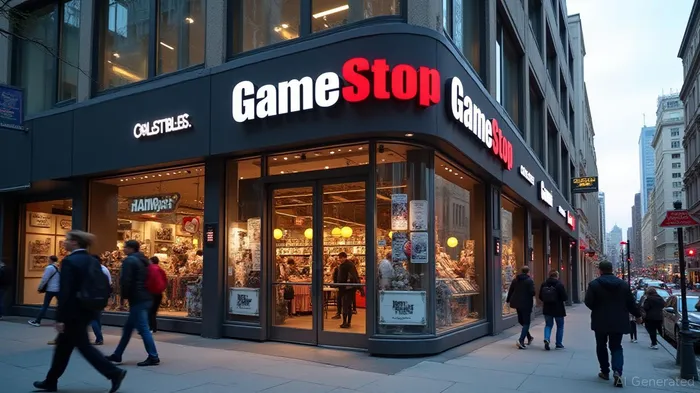GameStop's Volatile Path: Retail Sentiment and Governance in the Crosshairs
The saga of GameStopGME-- (GME) continues to captivate markets, blending retail investor fervor with corporate governance challenges. In 2025, the company's stock price has swung wildly—from a March high of $66.25 to a late-May dip fueled by concerns over its Bitcoin bets and stagnant revenue growth. This volatility underscores a critical question: Can GameStop reconcile its evolving strategy with the expectations of retail investors and institutional skeptics?
The Financial Crossroads
GameStop's first-quarter 2025 results reveal a company at a crossroads. Net sales fell 17% year-over-year to $732.4 million, as declining hardware/software sales (a traditional revenue pillar) offset growth in graded collectibles, which now account for 28.9% of revenue. While the operating loss narrowed to -$10.8 million, the $44.8 million net income was buoyed by a one-time $35.5 million impairment charge tied to international restructuring. The company's cash reserves, however, swelled to $6.4 billion—a stark contrast to $1.0 billion in 2024—thanks to cost-cutting and a $1.3 billion convertible notes offering.

Retail Sentiment: From Short Squeezes to Bitcoin Bets
Retail investors, the architects of GME's 2021 spike, remain a double-edged sword. Their enthusiasm for the stock has long been tied to its role as a symbol of democratized investing. Now, however, their focus has shifted to GameStop's unconventional moves, such as its recent purchase of 4,710 Bitcoin. This $1.3 billion gamble—funded partly by the convertible notes—mirrors MicroStrategy's crypto-heavy strategy but has raised eyebrows. A would reveal the tight correlation between investor sentiment and crypto volatility.
The May stock selloff, which saw shares drop 15% in 10 days, underscores the risks. Retailers may be questioning whether Bitcoin's price swings—and GameStop's lack of a clear revenue-generating crypto model—justify the exposure. Meanwhile, the pivot to collectibles, while promising in high-margin niches like trading cards, remains unproven at scale.
Governance: Cost-Cutting vs. Strategic Clarity
GameStop's governance choices reflect a balancing act between survival and vision. The divestiture of Canadian stores and other international operations has streamlined operations, reducing SG&A expenses by 22.7% year-over-year. Yet, the heavy reliance on non-GAAP metrics—such as an “adjusted net income” that excludes impairments—risks obscuring operational realities. Investors must scrutinize GAAP figures to assess true profitability.
The Bitcoin investment also raises governance concerns. While it aligns with CEO Matt Furlan's stated goal of “strategic capital allocation,” the move lacks the transparency seen in traditional investments. Regulatory disclosures flag risks like price volatility and liquidity constraints, but the decision to allocate 2% of cash reserves to crypto remains contentious.
The Analysts' Verdict: Caution or Opportunity?
Analysts are split. The Motley Fool, for instance, warns that GameStop's “cost-cutting over revenue growth” approach is unsustainable. Its Bitcoin bet is labeled “speculative,” with no clear link to core operations. Others, however, see merit in the collectibles strategy, noting its 86% year-over-year sales growth in 2024. The question remains: Can this niche offset the decline of hardware sales, which now account for just 52% of revenue?
Investment Implications
For investors, GameStop presents a high-risk, high-reward scenario. The $6.4 billion cash war chest provides a buffer, but the stock's volatility demands a long-term horizon. Key considerations:
1. Bitcoin Exposure: Monitor Bitcoin price movements and GameStop's rationale for holding it. A could highlight correlation risks.
2. Collectibles Growth: Track whether graded memorabilia sales sustain momentum, especially against competitors like eBay and specialized platforms.
3. Governance Transparency: Scrutinize GAAP metrics and the rationale behind non-traditional investments.
Final Analysis
GameStop's journey in 2025 is a microcosm of modern investing: retail passion meets corporate pragmatism, with governance choices amplifying both opportunities and pitfalls. While its cash reserves and collectibles pivot offer hope, the Bitcoin gamble and reliance on non-GAAP metrics introduce caution. For investors, the key is to distinguish between strategic bets and speculative distractions—a line GameStop itself must clarify.
In this volatile landscape, patience and a focus on fundamentals may reward those willing to navigate the noise. But as history shows, GME's story is never dull—and its next chapter remains unwritten.
Tracking the pulse of global finance, one headline at a time.
Latest Articles
Stay ahead of the market.
Get curated U.S. market news, insights and key dates delivered to your inbox.

Comments
No comments yet